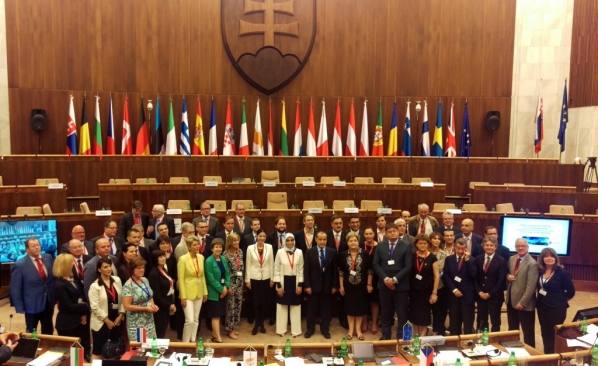In the framework of the parliamentary dimension of the Slovak Presidency of the European Union, Meeting of the Chairpersons of the Conference of Parliamentary Committees for Union Affairs of Parliaments of the EU (COSAC) took place in Bratislava today. Deputy Chairperson of the Committee on European Integration Ms Marija Maja Ćatović and member of the Committee Mr Danko Šarančić participated in the meeting.
Mr Béla Bugár, Deputy Speaker of the Slovak National Council, delivered welcome speech, saying that the EU was facing many challenges, such as populism, radicalism and lack of trust in the European institutions. With regard to that, the aim of parliamentarians should be bringing the Union closer to citizens, by encouraging communication and simplifying procedures, but also by improving relations of the EP and national parliaments. Mr Bugár announced that presidents of national parliaments and president of the EP will address these issues at the meeting scheduled for October of current of this year. Mr Ľuboš Blaha, Chair of the European Affairs Committee of the Slovak National Council, informed MPs about results of the meeting of the Troika Presidency, the Draft of the 26th semi-annual report of COSAC, and letters received by the Presidency.
When it comes to the priorities of the Slovak presidency of the EU Council, keynote address was given by Mr Miroslav Lajčák, Slovak Minister for Foreign and European Affairs, who pointed out that Slovakia identified four key priorities, namely: economic empowerment of Europe, modernization of the single market through the creation of a single energy market and digital agenda, establishment of sustainable policy of migration and asylum and strengthening the global commitment of the EU. In terms of external relations, he expressed his full support to signing of trade agreements with the USA (TTIP) and Canada (CETA). Mr Lajčák stressed the importance of the EU enlargement process, as the best mechanism for political and economic transformation of societies, adding that comprehensive reform is the most important task of the candidate countries.
Within this session, European parliamentarians discussed the current challenges in the functioning of the EU, such as the exit of the UK from the EU, illegal immigration and functioning of the Schengen area. British parliamentarians also stated their opinions about relations of the UK and EU. The participants were also addressed by Ms Maja Ćatović, who pointed out that Montenegro had been achieving tangible results in the negotiations with the EU, bearing in mind that by opening chapter 12 and 13 the total number of opened chapters was 24, two of which being temporarily closed. Ms Ćatović added that Montenegro’s priority was improving the quality of citizens’ life and implementation of reforms, welcoming the support of the European institutions and member states in this regard. She said that Slovakia had continuously provided technical and administrative support to Montenegro.
The second session was related to the EU social dimension and Cohesion policy, and the following addressed: Mr Mars Di Bartolomeo, Luxembourgish Speaker of the Chamber of Deputies, Ms Marianne Thyssen Commissioner for Employment, Social affairs, Skills and Labour mobility of the European Commission and professor Mr Jan Keller, member of the Committee on Employment and Social Affairs of the EP. Mr Bartolomeo said that the EU has been facing high unemployment rates and social inequality, therefore new social policies should be focused on social cohesion, economic security and quality of life. He called for the establishment of a system which would evaluate all European measures in terms of their impact on the social dimension. Commissioner Thyssen presented the work on modifying the Directive 96/71/EZ on sending workers in the framework of the provision of services from 1996, in order to combat social dumping, while Professor Keller called on creating policy that will address the impact of financial markets, for the purpose of strengthening social cohesion. During the discussion, multiple parliamentarians supported the said directives and they have also agreed on the importance of promoting cooperation in the field of social policy.

